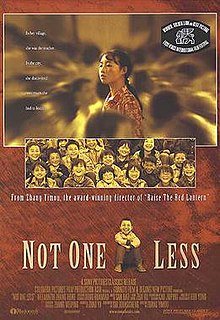| Not One Less | |
|---|---|
 Film poster | |
| Traditional Chinese | 一個都不能少 |
| Simplified Chinese | 一个都不能少 |
| Hanyu Pinyin | Yīgè dōu bùnéng shǎo |
| Directed by | Zhang Yimou |
| Written by | Shi Xiangsheng |
| Produced by | Zhang Yimou |
| Starring | Wei Minzhi Zhang Huike |
| Cinematography | Hou Yong |
| Edited by | Zhai Ru |
| Music by | San Bao |
Production companies | |
| Distributed by | Columbia TriStar Film Distributors International |
Release dates |
|
Running time | 106 minutes |
| Country | China |
| Language | Mandarin |

Not One Less is a 1999 drama film by Chinese director Zhang Yimou, adapted from Shi Xiangsheng's 1997 story A Sun in the Sky (Chinese: 天上有个太阳; pinyin: tiān shàng yǒu ge tàiyáng).[1][2] It was produced by Guangxi Film Studio and released by China Film Group Corporation in mainland China, and distributed by Sony Pictures Classics in North America and Columbia TriStar Film Distributors internationally.
Set in the People's Republic of China during the 1990s, the film centers on a 13-year-old substitute teacher, Wei Minzhi, in the Chinese countryside. Called in to substitute for a village teacher for one month, Wei is told not to lose any students. When one of the boys takes off in search of work in the big city, she goes looking for him. The film addresses education reform in China, the economic gap between urban and rural populations, and the prevalence of bureaucracy and authority figures in everyday life. It is filmed in a neorealist/documentary style with a troupe of non-professional actors who play characters with the same names and occupations as the actors have in real life, blurring the boundaries between drama and reality.
The domestic release of Not One Less was accompanied by a Chinese government campaign aimed at promoting the film and cracking down on piracy. Internationally, the film was generally well-received, but it also attracted criticism for its ostensibly political message; foreign critics are divided on whether the film should be read as praising or criticizing the Chinese government. When the film was excluded from the 1999 Cannes Film Festival's competition section, Zhang withdrew it and another film from the festival, and published a letter rebuking Cannes for politicization of and "discrimination" against Chinese cinema. The film went on to win the Venice Film Festival's Golden Lion and several other awards, and Zhang won the award for best director at the Golden Rooster Awards.
- ^ Cite error: The named reference
Zhang136was invoked but never defined (see the help page). - ^ Kwok & McKnight 2002, p. 102.